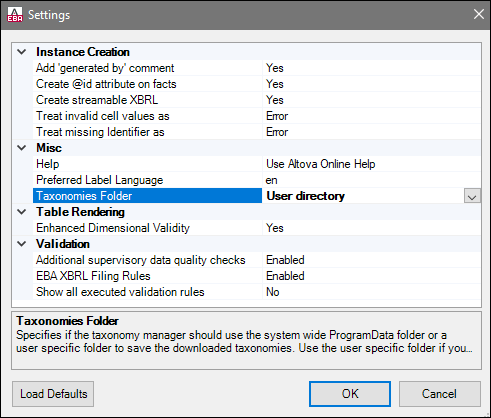Settings
The Settings dialog (screenshot below) allows you to configure parameters related to export, validation, Help, language, and table rendering. To view or change the add-in settings, click Settings on the add-in ribbon. For more information, see the subsections below.

Export (common)
The common export settings are described in the table below.
Setting | Description |
|---|---|
Treat invalid cell values as | Specifies whether invalid cell values should be treated as validation errors or warnings. The default value is Error.
|
Treat missing Identifier as | The Identifier property is available in the Filing Pane and is empty by default. The Treat missing Identifier as option specifies whether an empty identifier should trigger a validation error or a warning. The default value is Error.
|
Export (xBRL-CSV)
The xBRL-CSV export settings are described in the table below.
Setting | Description |
|---|---|
Check xBRL-CSV Table Constraints | If enabled (default), this option verifies that the report content complies with the rules defined in the EBA taxonomy, including allowed dimension combinations, unique row keys, and consistency with taxonomy-specific business rules (e.g., totals).
For more information about table constraints, see the xBRL-CSV Table Constraints Specification.
|
Validate xBRL-CSV reports on export | If enabled (default), this option checks the exported xBRL-CSV file against basic validation rules, including syntax, required columns, data types, and overall taxonomy compliance.
|
Export (xBRL-XML)
The xBRL-XML export settings are described in the table below.
Setting | Description |
|---|---|
Add 'generated by' comment | Specifies if exported XBRL instances should contain a Generated by comment. Set this option to No if your reporting authority does not allow comments in reports. The default value is Yes.
|
Create @id attribute on facts | In accordance with the EBA XBRL Filing Rules (Section 3.7), optional @id attributes on facts should not be included in the report unless they are needed (e.g., for referencing). In the EBA Add-in, @id attributes are added to all facts, allowing direct navigation to cells with validation errors.
•Yes (default): Adds an @id to every fact for easier navigation and debugging, but you may see warnings on submission. •No: Only required @id attributes are included; optional ones are omitted, which may limit navigation to specific cells with errors.
|
Create streamable XBRL | Specifies if exported XBRL instances should be streamable and contain the xbrl-streamable-instance processing instruction. Set this option to No if your reporting authority does not allow processing instructions in reports. The default value is Yes. For more information about streamable XBRL instances, see XBRL Streaming Extensions Module 1.0.
|
Misc
This section enables you to specify the format of the add-in manual, the language used in headers, and the location of downloaded taxonomies.
Setting | Description |
|---|---|
Help | Specifies whether the Altova Online Help in HTML format (default option) or the locally installed PDF file should be used.
|
Preferred Label Language | Specifies the preferred language to be used in the headers of worksheets. For this setting to take effect, the appropriate label resources must be defined in the taxonomy. The default value is en.
|
Taxonomies Folder | Specifies where downloaded taxonomies should be stored:
•Global-package folder: C:\ProgramData\Altova\pkgs\.cache •User folder: <USER-HOME>\Documents\Altova\pkgs\.cache
Select the user folder if you do not have permission to write to the ProgramData folder.
Important: The two folders are independent. If you switch from one folder to the other and want to use the same taxonomies, you must reinstall them in the new folder.
|
Table Rendering
The Enhanced Dimension Validity property ensures that only cells that are dimensionally valid in at least one base set with a linkrole containing the corresponding RCCode of the table are activated.
•Yes (default, recommended): Activates only dimensionally valid cells, helping prevent invalid data entries.
•No: All cells are activated regardless of dimension validity. Set this value if you encounter problems with data submission to your reporting authority.
For more information about Dimensional Validity, see Technical Considerations for the Use of XBRL Dimensions 1.0.
Validation
This section enables you to specify whether additional XBRL filing rules should be used and whether all executed validation rules should be included in the report.
Setting | Description |
|---|---|
Additional supervisory data quality checks (Enterprise Edition) | Specifies whether any additional supervisory checks of your data (if available for the corresponding entrypoint) should be performed. The default value is Disabled.
|
XBRL Filing Rules | Specifies whether the report should be checked against any additional EBA XBRL Filing Rules. The default value is Enabled.
|
Show all executed validation rules | If this option is enabled, the report displays all executed validation rules, including those that failed. The default value is No.
|